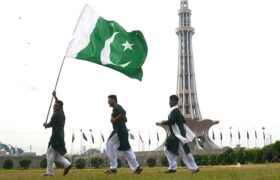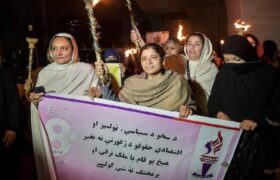SALMAN AHMAD
Populism, a political ideology fueled by people’s antagonism against elites and their perceived corruption, has emerged as a significant phenomenon in several countries, Pakistan included. Populism emphasizes the interests of the common people over the corrupt elites, based on the distinction between two groups in a society: the poor and the corrupt elites. Populist leaders often appeal to the emotions and sentiments of the public by promising to address their grievances and solve their problems. History bears testimony to the fact that these appeals often lack rationale and facts.
The emergence of populist politics can be traced back to the Farmers Alliance of the 1840s in the United States and to Latin American populism in the mid-20th century. The great recession of 2008 is considered a catalyst for sparking populism in Europe and America. Prominent populist figures in recent history across the world include USA’s Donald Trump, Turkiye’s Recep Tayyab Erdogan, Italy’s Matteo Salvini, Venezuela’s Hugo Chávez, Brazil’s Jair Bolsonaro, France’s Marine Le Pen, Hungary’s Viktor Orbán and Philippines’ Rodrigo Duterte.
Populism in South Asian countries including Pakistan, Bangladesh, and India is somehow different from that of Europe and America. The issues concerning populism in Asia are countering elites, poverty, corruption and minority-related issues. In the Pakistani context, family dynasties in politics i.e., Bhutto and Sharif families, remained the main targets of populism. Populism remained a prominent feature of Pakistan’s politics since its inception in 1947. Several politicians such as Zulfiqar Ali Bhutto, his Daughter Benazir Bhutto, and recently Imran Khan employed populist rhetoric and familiarised populist policies to get the masses’ support for ruling the country.
In recent years, Imran Khan, the former prime minister of Pakistan, emerged as a prominent populist leader. He rose to power in 2018 utilising populist rhetoric of anti-corruption and economic reforms, and a promise to create “Naya (New) Pakistan” that would be free from the influence of the country’s traditional political elites. Using populist rhetoric Imran Khan’s party, the Pakistan Tehrik-e-Insaf (PTI), won most of the National Assembly (NA) seats allowing him to become the prime minister of the country. Being a marginal player in the country’s politics, it was a significant achievement for him. However, questions raised over the fairness and transparency of the elections.
Social scientists and scholars have highlighted a number of characteristics of populism and a populist leader. Most of the scholars criticised the populist ideology and some termed it as a potential challenge for real democracy. Populist leaders create a narrative that the earlier power elites only served their own interests and never actually represent the people. And the people will rule the country if that populist leader was chosen to rule. Populist leaders around the world possess common attributes and characteristics; some of these characteristics are briefly discussed and the conduct of Imran Khan as a populist leader has been analysed in light of these characteristics.
“We are the pure people; they are the corrupt leaders”; is the universal catch-phrase being used by populists implying that the populist leader and his followers are the embodiment of the true will and interest of the people portraying the established power elites as corrupt, self-serving and disconnected from the needs and concerns of the common people. By doing so, they seek to delegitimise the existing elites and present themselves as a viable alternative. In Imran Khan’s discourse, the root cause of all the problems in Pakistan is corruption within the ruling elites (hidden from the eyes of common people) which has led to economic downfall and resulted in unemployment, inflation, and foreign debt.
Populist leaders exacerbate polarisation anddivision within the society, institutions and media, framing the political debate as ‘us’ (populists) versus ‘them’ (opposition). They foster an “either with us or against us” mentality making it difficult for constructive dialogue and pluralism. This polarisation often led to conflict within the society and institutions destined for anarchy and chaos. Imran Khan’s populist program was also based on polarisation and confrontational rhetoric which contributed to the political instability and chaos in the country. PTI-led government remained in unprecedented confrontation with the opposition throughout his tenure as prime minister of the country.
Populist leaders tend to manipulate liberal democratic institutions and processes i.e., elections, to gain power and legitimise their rule. They try to undermine and often weaken democratic institutions by eroding the independence and credibility of these institutions. Constitutional and valued neutrality of democratic institutions often remains suspended under a populist leader. Imran Khan undermined the authority of the constitutional institutions including the Election Commission, judiciary, and law enforcement agencies during his tenure as prime minister of the country. As a populist leader, he pressurised institutions for personal and political gains. Imran Khan’s victory in the 2018 General Elections was subjected to controversy and allegations of fraud. Analysts and critics argue that the lack of transparency and fairness in the electoral process has damaged the credibility of Pakistan’s democratic institutions under Khan’s rule. Populist leaders often demonstrate a reluctance to acknowledge or value the significance of opposition within a democratic system. They attempt to discredit opposition by questioning their legitimacy, portraying them as part of corrupt elites and labelling them as enemies of the people. They use derogatory language and dismiss opposing voices terming them as irrelevant. The Khan-led previous government used all its might to suppress opposition by putting almost all key opposition leaders in jails. It took extreme measures to suppress opposition voices within the politicians, civil society and media. The accusations of influencing the judiciary were levelled against Imran Khan for gaining an advantage over his political opponents. He created an uneven playing field for the opposition and undermined the fairness of the country’s democratic process.
Another key characteristic of populist leaders or governments is targeting the independence of media and suppression of critical voices. They tend to attack journalists and media organisations labeling them asenemies or opponents while undermining their credibility.
Through media management and control, populist leaders attempt to shape public narratives, restrict access to alternative viewpoints and limit media’s ability to hold them accountable. Media in Pakistan under Imran Khan was subjected to the worst kind of persecution in the democratic history of the country. Journalists were pressurised and maltreated, and media organisations were forced to remove those who were critical to the government. During the Imran Khan era, civil society organisations including NGOs, advocacy forums and human rights organisations were also discredited. Intimidation tactics were used by the government to restrict activities of civil society, limited their funding and shrunk enabling environment for the activists.
Some populist leaders have also known to exhibit a tendency to challenge and undermine checks and balances which are the significant aspects of a democratic system. By reducing checks and balances (imposed by the state institutions) the populist leaders exert control over the decision-making process and limit accountability. Populist leaders deny the balance of power because they usually don’t believe in accountability and think that they are always right. Imran Khan also exerted the same tendency during his regime. He targeted accountability organisations, pressurised courts and attacked the credibility of the organisations responsible for accountability. Populist leaders tend to make decisions based on personal or narrow interests rather than following an established democratic process or consulting a diverse range of stockholders. They also try to present unrealistic and over-simplistic solutions to the most complex issues aimed at appeasing the voters. Policies driven by unrealistic expectations most of the time have potentially harmful consequences and do not adequately address the root causes of the problems. Khan’s populist policies were the establishment of a welfare state, the provision of millions of Jobs and houses for the poor and the introduction of bizarre business models. These promises seem very attractive on their face but materializing them requires the capacity lacking by the then government.
The current political turmoil in Pakistan, which is the result of various factors including Imran Khan’s populist politics, has significant impacts on the lives of ordinary Pakistanis. These impacts include economic instability, social unrest, and political polarisation, which all have negative consequences for people’s well-being and quality of life. Pakistani people cannot afford this political turmoil anymore. This country needs stable and effective governance to address challenges and promote the well-being of all of its citizens.




